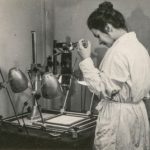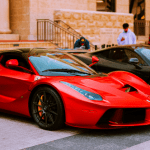 History
History  History
History  History
History 10 “Modern” Problems with Surprising Historical Analogs
 Health
Health 10 Everyday Activities That Secretly Alter Consciousness
 History
History Top 10 Historical Disasters Caused by Someone Calling in Sick
 Animals
Animals 10 New Shark Secrets That Recently Dropped
 Movies and TV
Movies and TV 10 Forgotten Realities of Early Live Television Broadcasts
 Technology
Technology 10 Stopgap Technologies That Became Industry Standards
 Weird Stuff
Weird Stuff 10 Wild Facts About Taxidermy That You Probably Didn’t Know
 Travel
Travel 10 Beautiful Travel Destinations (That Will Kill You)
 Miscellaneous
Miscellaneous 10 Modern Marriage Rituals Born from Corporate Branding
 History
History 10 Extreme Laws That Tried to Engineer Society
 History
History 10 “Modern” Problems with Surprising Historical Analogs
 Health
Health 10 Everyday Activities That Secretly Alter Consciousness
Who's Behind Listverse?

Jamie Frater
Head Editor
Jamie founded Listverse due to an insatiable desire to share fascinating, obscure, and bizarre facts. He has been a guest speaker on numerous national radio and television stations and is a five time published author.
More About Us History
History Top 10 Historical Disasters Caused by Someone Calling in Sick
 Animals
Animals 10 New Shark Secrets That Recently Dropped
 Movies and TV
Movies and TV 10 Forgotten Realities of Early Live Television Broadcasts
 Technology
Technology 10 Stopgap Technologies That Became Industry Standards
 Weird Stuff
Weird Stuff 10 Wild Facts About Taxidermy That You Probably Didn’t Know
 Travel
Travel 10 Beautiful Travel Destinations (That Will Kill You)
 Miscellaneous
Miscellaneous 10 Modern Marriage Rituals Born from Corporate Branding
10 Historic Instruments Worth More Than a Luxury Car
Lists of famous musical instruments often focus on who played the instrument. This list is different. Here, we’ll highlight ten musical instruments that have sold for the highest prices or that are considered to be the most valuable instruments in the world. The value of a musical instrument is always tied to the compelling story behind it.
Sometimes, the instrument is crafted by a master maker whose secrets we still don’t fully understand. Other times, the value comes from the seemingly superhuman abilities of the person who played it. Another common theme stems from an instrument being one of the last remaining pieces made by a famous company or instrument maker. One final theme is when the instrument has such an original story behind it that people find it almost impossible to believe—they need to see the instrument with their own eyes.
You’ll definitely learn something new from this list. Many of these instruments are not well known to the general public. Often, the stories of these rare and expensive instruments are only known to hardcore fans of the musical genres associated with each instrument. Let’s shine some light on these ten famous musical instruments that are probably worth more than the car you’re currently driving.
Related: Top 10 Bizarre Musical Instruments You Rarely See Today
10 Paul McCartney’s $12.6 Million Hofner Bass
Paul McCartney’s 1960 Hofner bass is one of the most famous musical instruments in history. The extremely rare bass was stolen from McCartney in 1972, leading many to believe that it was lost forever. Through an incredible turn of events, the bass was returned to McCartney in late 2023. It’s worth an estimated 10 million British pounds, or about 12.6 million U.S. dollars.
Stolen from the back of a van in London’s Notting Hill on the night of October 10, 1972, McCartney’s bass changed hands several times over the years. After stealing the bass, the thief sold it to the landlord of a pub in the Notting Hill area. An English mother of two, Cathy Guest, discovered the bass in her attic many decades later. Unaware of its legendary past, she did some research and realized it belonged to the legendary Beatle. It turns out that her late husband, Rauidhri Guest, had inherited the instrument many years before when he was a 21-year-old film student.
The Hofner company verified the provenance of the bass (that it was actually the same bass stolen from McCartney) after it was returned to him. McCartney reportedly handed a six-figure reward to Cathy for her miraculous find. A team of experts is now helping McCartney to restore the bass to its original playing condition.[1]
9 Korg’s PS-3300: The $100,000 Synthesizer
When Korg released the PS-3300 in 1977, it was a luxurious musical instrument that only the wealthiest musicians could afford. Over the decades, it became a very rare and coveted item, so much so that one sold for $100,000 in 2021. The rarity and popularity of the original Korg PS-3300 led software developers to create modern reinterpretations of the iconic instrument as computer programs called virtual synthesizers. For example, Cherry Audio created a virtual synthesizer that can run on a computer to recreate all the sounds of the original physical Korg PS-3300 synthesizer.
The original PS-3300 was extremely large, and it packed a lot of functionality into that space. It featured a semi-modular design with three independent synthesizer units, each essentially a complete polyphonic synthesizer on its own. Each unit had 12 tunable oscillators, filters, envelopes, and amplifiers for every note, allowing all 48 keys to be played simultaneously with independent articulation. This unique architecture enabled musicians to create rich, evolving sounds that were groundbreaking at the time. Synthesizer pioneer Bob Moog considered the PS-3300 “the best synthesizer for fat sounds.”
Cherry Audio carefully studied the original PS-3300 to create a virtual synthesizer with a feel and playability similar to the original instrument. Their digital PS-3300 captures the sound and unique features of the original, with each key functioning as its own synthesizer. It has 49 keys, each equipped with three oscillators, filters, envelopes, and amplifiers, for a total of 147 synth voices. They also added modern enhancements like MIDI control, integrated effects, and over 360 presets.[2]
8 The $73,000 Platinum Flute
The William S. Haynes handmade custom flute is made of platinum, and it’s one of the most expensive flutes in the world. It costs as much as a high-end automobile. Buying one will set you back $72,799, an incredibly high price for any new musical instrument. The Haynes flute is both expensive and stunning to look at. It features a platinum body and a hand-cut headjoint that has a 14-karat rose gold lip plate and riser.
The Haynes flute is precision manufactured in the United States. Its precision-made components include soldered 14-karat gold tone holes and gold springs on the flute’s keys. The flute’s unique combination of platinum and gold might give it different tonal qualities than other lower-end professional flutes. Professional flutes are typically made of less expensive metals like silver, though some world-class flutists, like Sir James Galway, play flutes made of gold.
In May of 2019, a popular YouTube flutist who goes by the name “katieflute” published a video where she played the William S. Haynes handmade custom flute. As of September 2024, the video has over 250,000 views. When the video was recorded in 2019, the Haynes flute was actually more expensive than it is now: it came in at a cool $84,000 at that time. At either price, you could purchase a luxury car for the price of one of these high-class/high-end flutes.[3]
7 Joey DeFancesco’s Priceless Blonde Hammond B3 Organ
Joey DeFrancesco (1971–2022) was a prominent jazz organist and considered to be a world-class virtuoso of the famed Hammond B3 organ. He was the son and grandson of jazz musicians; his grandfather was Joseph DeFrancesco, and his dad was organist “Papa” John DeFrancesco (1940–2024). Joey DeFrancesco recorded and played with a who’s who of the music industry, including Miles Davis, David Sanborn, and trumpeter Randy Brecker and his brother, Michael Brecker.
In 2003, Joey DeFrancesco sold his very rare and beloved “blonde” Hammond B3 organ on eBay to an Australian buyer named Geoff Williamson. But there was a catch: whenever Joey performed in Australia, the organ had to be made available for him to play. In 2019, Joey was headlining the Generations in Jazz festival in Mount Gambier, South Australia. True to his word, Geoff brought “Blondie” out of storage and made it available for Joey to perform on.
Now that Joey DeFrancesco has passed away, it’s hard to evaluate what his rare blonde Hammond instrument is worth, but it’s certainly worth more than other rare blonde Hammond B3s out in the wild. Joey DeFrancesco was well-known, nominated for four Grammy Awards, and signed his first recording contract with Columbia Records at the age of 16. I couldn’t find any YouTube video footage of DeFrancesco playing his blonde Hammond B3, but I found great footage of him playing a more traditional Hammond B3 organ to showcase his musical mastery.[4]
6 The $600,000 Piano from the Movie Casablanca
In 2012, the piano featured in the 1942 classic film Casablanca was sold at a Sotheby’s auction in New York for $602,500. The 58-key piano was expected to sell for up to $1.2 million, but selling for $600,000 was still an incredible sum for a worn-out 70-year-old instrument. The piano’s seller made an extremely large profit at the auction, having purchased the piano for $154,000 in 1988.
This historic piano is the exact same one played by actor/musician/singer Dooley Wilson in the movie. His memorable character, “Sam,” sang the song “As Time Goes By” in one of the film’s most famous scenes. Sold to an unidentified buyer, the piano was the highlight of more than 200 pieces of Hollywood memorabilia up for sale at the 2012 auction.
Interestingly, “As Time Goes By” was almost cut from the movie due to its initial lack of popularity. Had the song been removed, we would have probably never heard of this rare and historic piano that is now a permanent part of the great American film story.[5]
5 Ringo Starr’s Ludwig Drum Kit
Ringo Starr’s original Ludwig Oyster Black Pearl kit is considered to be one of the most valuable and rare drum kits in the world. In the early 1960s, American instruments were rare and expensive in Britain, making them highly coveted by British musicians. Ringo, who was playing Premier drums at the time, stumbled upon the Ludwig kit in a London music store, and he instantly fell in love with the drum set. Once he saw and played it, he knew that he had to purchase it.
When purchasing the kit, the store owner went to remove the Ludwig logo, but Ringo insisted that it stay on to clearly identify the drum set as American-made. Starr’s decision was one of the best strokes of luck for the Ludwig company: the logo was prominently displayed during The Beatles’ performances. The famed drum set, perhaps the most famous drum set in the world, became an integral part of The Beatles’ image as they rose to become one of the world’s biggest rock bands.
As The Beatles’ schedule became more demanding, Ringo acquired additional Ludwig kits to keep up with their live performances, recordings, and film commitments like “A Hard Day’s Night.” Today, his original Ludwig kits are priceless pieces of music history. They are rare, highly sought after, and can definitely cost more than a luxury car if you can actually find one to buy.[6]
4 Charlie Parker’s Rare $144,000 Grafton Acrylic Alto Saxophone
On Friday, May 15, 1953, one of the most historic jazz concerts of all time took place at Massey Hall in Toronto, Canada. It was the last time that the five founding members of the bebop jazz movement played together as a quintet. The five members of the group are all household names among avid jazz fans: Dizzy Gillespie on trumpet, Charlie Parker on alto saxophone, Bud Powell on piano, Charles Mingus on bass, and Max Roach on drums.
Another thing that made the concert historic was that it was one of the few documented recordings of Charlie Parker playing a plastic/acrylic saxophone that was given to him as a gift by a company called Grafton. According to Red Rodney, a famous trumpeter who was a member of Charlie Parker’s Quintet for three years in the early 1950s, a Grafton company representative gave Parker the plastic saxophone in Detroit, Michigan. He ended up playing this saxophone at the May 15, 1953, jazz concert.
Charlie Parker’s Grafton saxophone now resides in the American Jazz Museum in the 18th and Vine Jazz District in his hometown of Kansas City, Missouri. The museum won the prized saxophone in a 1994 auction at Christie’s Auction House in London. The then-mayor of Kansas City, Emanuel Cleaver II, monitored the auction remotely with city officials in hopes of winning the piece of jazz history. Kansas City won the auction at a final price of $144,000, and the saxophone is now on display in the American Jazz Museum in the same neighborhood where a very young Charlie Parker attended jazz jam sessions during his formative years in the late 1930s and early 1940s.[7]
3 The $45 Million Stradivarius Viola
In 2014, Sotheby’s tried to auction off the extremely rare Macdonald Stradivarius viola for $45 million. The viola, constructed in 1701 by master instrument maker Antonio Stradivari, is one of only eleven surviving violas he ever made, making it even rarer than his famous violins. The auction was expected to break world records, but not a single bid came through.
The Macdonald viola has a rich and storied history. It was played by Peter Schidlof of the Amadeus Quartet until his death in 1987. After that, it spent nearly 30 years in a vault, becoming one of the best-preserved Stradivarius instruments. Its scarcity and condition make it highly valuable, yet its high price tag scared off potential buyers. It’s the only one of its kind not owned by a museum or foundation, meaning it could still potentially be sold one day.
The failed auction raised an interesting social question. Should very rare musical instruments be played or preserved? Since playing a musical instrument regularly greatly increases the risk of damage, it is very likely that this amazingly rare viola will one day end up in a museum or in the home of a wealthy collector willing to ensure that it is adequately protected.[8]
2 Kurt Cobain’s $6 Million Guitar
Kurt Cobain (1967–1994) was, and still is, a household name among many hardcore music fans due to his fascinating time as the lead singer and guitarist of the American grunge band Nirvana. His death by suicide in April 1994 stunned the world and elevated him to such a level of fame that, in many parts of the world, it would be difficult to find someone who hasn’t heard of him.
In 1993, Nirvana performed on MTV Unplugged, and the 1959 Martin D-18E that Cobain played during the performance is considered to be one of the most famous guitars in the world. In June 2020, the guitar sold for slightly more than $6 million at auction, making it the most expensive guitar ever sold.
The winning bidder was Peter Freedman, the founder of Rode Microphones. At the time of winning the auction, Freedman planned to take the guitar on a worldwide exhibition tour to raise awareness and funds for the arts community. The staggering price paid for the guitar shows how valuable musical instruments that are considered to be part of our collective memories can be. People often see these instruments as ways to connect with their long-gone heroes in a real and visceral way.[9]
1 The $15.3 Million Stradivarius Violin Played by Albert Einstein’s Teacher
Anything closely connected to the world’s most famous theoretical physicist, Albert Einstein, is inevitably destined to sell for extremely high dollar amounts. The Stradivarius violin played by one of Einstein’s teachers is no exception. In 2022, this incredibly rare Stradivarius violin sold for $15.3 million at auction.
This particular violin was crafted in 1714 by Antonio Stradivari, perhaps the world’s most well-known violin maker. It once belonged to Toscha Seidel, a Russian-American violin virtuoso. Seidel used this instrument to record the soundtrack of the 1939 American film The Wizard of Oz. More notably, Seidel also played this violin alongside Einstein while giving Einstein private music sessions.
In 1933, Seidel and Einstein played a concert together in New York to raise funds for German-Jewish scientists fleeing the Nazi regime. The violin itself was part of Stradivari’s “Golden Period,” when he created his most coveted and highly valued instruments. Of the thousands of pieces Stradivari made, only about 600 are known today, with very few from this elite period. This famous Stradivarius was previously part of the Munetsugu collection in Japan. Though its most recent buyer remains anonymous, the violin’s connection to Einstein ensures that it won’t be forgotten any time soon.[10]








